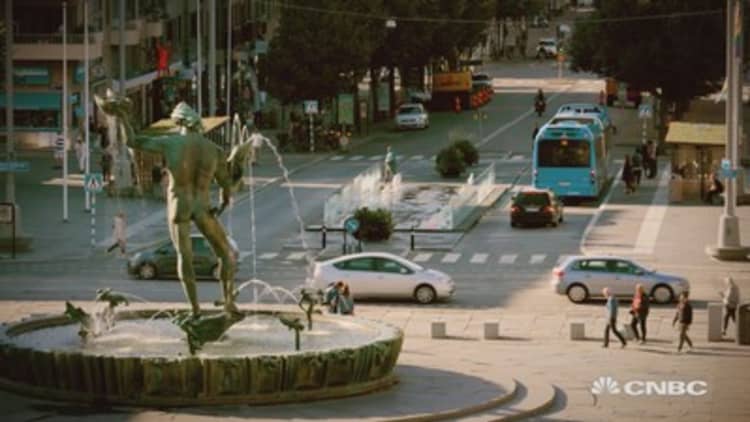
From hydrogen-powered buses to cycle-share schemes and electric taxis, the way we move around our cities and towns is rapidly evolving.
A raft of technological developments mean that the potential mass adoption of autonomous cars is no longer the stuff of science-fiction.
And in Gothenburg, authorities are looking to turn the Swedish city into an amenable environment for self-driving cars.
"As city planners, we realized that around the world there's a huge focus on developing the new technology for autonomous vehicles," Monica Wincentson, an urban planner at Gothenburg's City Planning Authority, told CNBC's "Sustainable Energy."
She said that, as of yet, there had not been a "significant collaboration" between car manufacturers and city planners. "In order for autonomous vehicles to work well we absolutely have to work together."
Wincentson was positive about what autonomous cars could bring to Gothenburg. "We think the benefits for the city will be safer and more secure transportation – the flow of traffic will be more even, smooth and efficient."
Nevertheless, there are concerns from some quarters regarding the safety of autonomous vehicles, an issue Wincentson was keen to address. "The safety for both pedestrians and passengers is important, and comprehensive testing of the technology is required," she said. "We will continue to have traffic regulations for vehicles and pedestrians."
And what does the future hold for electric cars? "I think we're at a tipping point for electric vehicles, where in the next two or three years you're going to see a large amount of battery production coming online, which is going to make them really much cheaper," Malcolm McCulloch, associate professor in engineering science at the University of Oxford, told CNBC.
On the subject of autonomous vehicles being integrated into the streets of old cities, McCulloch was optimistic. "I think they actually can fit in quite well – automated vehicles are really good at perceiving their surroundings," he said. "And actually, there are a lot of clues for them to pick up in older cities, so looking at buildings and the like."
The real challenge, he said, would be how autonomous vehicles interacted with motorcycles, bicycles, and pedestrians. "Because quite often we use human cues when we interact… and that's where their challenge at the moment is: how do they pick up on the small micro cues."




